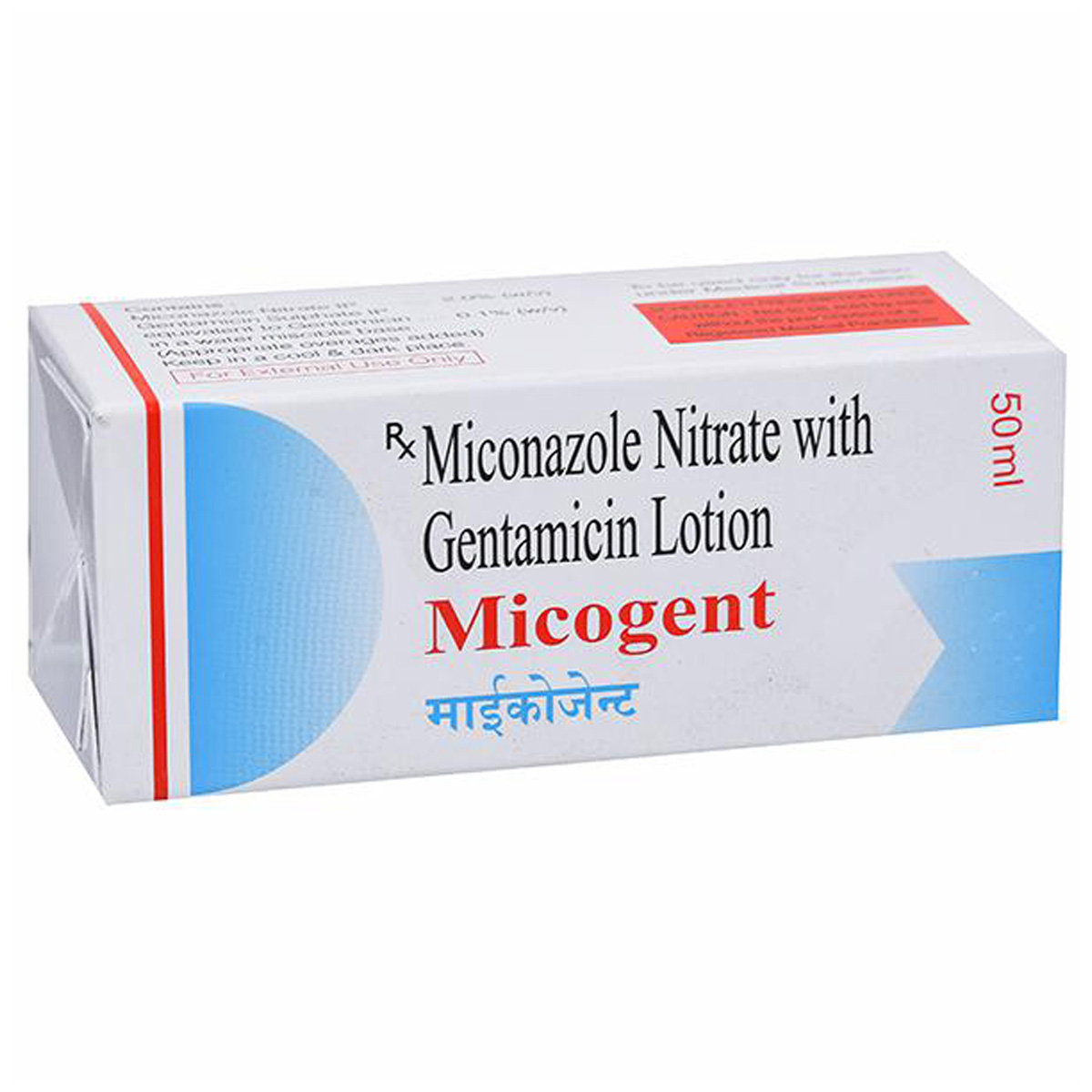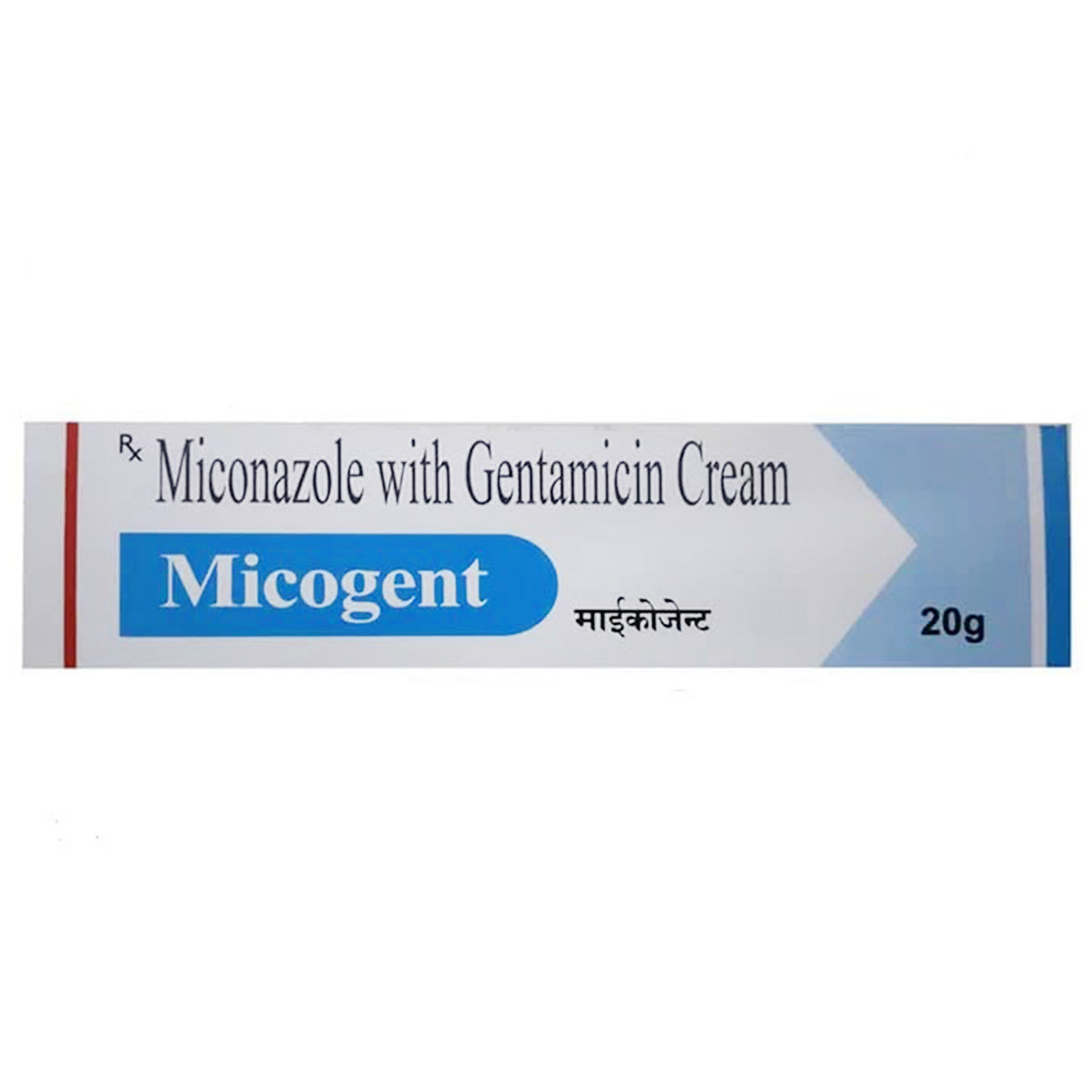Gentamicin+miconazole
About Gentamicin+miconazole
Gentamicin+miconazole belongs to a class of dermatological medication ‘Topical Anti-Infectives' used to treat the skin's fungal and bacterial infections. Also, the Gentamicin+miconazole reduces swelling, itching, and redness caused due to certain skin problems. Fungal infection is a skin disease in which a fungus attacks the tissue and causes infection. Fungal infections may be contagious (spread from one person to another). A bacterial infection is a condition in which harmful bacteria grow in the body and cause infection. It can infect any part of the body and multiply very quickly.
Gentamicin+miconazole is a combination of two drugs: Gentamicin (antibiotic) and Miconazole (antifungal). Gentamicin+miconazole treat both fungal and bacterial infections of the skin. Gentamicin is an antibiotic that destroys bacteria by preventing important proteins needed by bacteria from being synthesized to perform vital functions. Miconazole is an antifungal that prevents fungi from developing by keeping them from forming their own protective coating. Together, the skin infection is successfully treated.
Gentamicin+miconazole is only for external use. Take a small amount of Gentamicin+miconazole on the finger and apply it as a thin layer on the clean and dry affected area. Avoid contact of Gentamicin+miconazole with nose, ears, mouth, or eyes. In case Gentamicin+miconazole comes in contact with these areas accidentally, rinse with water thoroughly. Some people may experience skin peeling, dry skin, thinning of the skin, itching, pain, swelling, redness, irritation, or burning sensation at the application site. Most of these side effects of Gentamicin+miconazole do not require medical attention and gradually resolve over time. However, if the side effects worsen or persist, please consult your doctor.
If you are allergic to Gentamicin+miconazole or any other medicines, please tell your doctor. Do not use Gentamicin+miconazole in more than prescribed doses or for a prolonged time as it may cause adverse effects. If you are pregnant or a breastfeeding mother, it is advised to consult a doctor before using Gentamicin+miconazole. Gentamicin+miconazole is not recommended for children below 1 year of age. Avoid using Gentamicin+miconazole on damaged or broken skin or within skin folds. Do not wrap or cover the treated area with airtight dressings unless advised by a doctor. Avoid using Gentamicin+miconazole for more than 5 days in children and on the face. Do not swallow Gentamicin+miconazole. In case of accidental swallowing, consult a doctor immediately. Avoid smoking or going near naked flames as Gentamicin+miconazole catches fire and burns easily. If you have rosacea (redness and often red, small, pus-filled bumps on the face), acne, perioral dermatitis (redness and swelling of the skin around the mouth), psoriasis, glaucoma, cataracts, diabetes, adrenal gland or liver problems, genital itching or other skin problems, inform your doctor before taking Gentamicin+miconazole.
Uses of Gentamicin+miconazole
Medicinal Benefits
Gentamicin+miconazole is a combination of two drugs: Gentamicin (antibiotic) and Miconazole (antifungal). Gentamicin+miconazole treat both fungal and bacterial infections of the skin. Gentamicin is an antibiotic that destroys bacteria by preventing essential proteins needed by bacteria from being synthesised to perform vital functions. Miconazole is an antifungal that prevents fungi from developing by keeping them from forming their own protective coating. Together, the skin infection is successfully treated.
Directions for Use
- Follow your doctor’s instructions on the dosage and timing of this medication to ensure safety.
- Take a small amount of Gentamicin+miconazole on the fingertip and apply it as a thin layer on the clean and dry affected area as advised by your doctor.
- Gentamicin+miconazole is only for external use.
- Avoid contact of the Gentamicin+miconazole with the nose, mouth, or eyes. In case of accidental contact with these areas, rinse with water thoroughly.
Storage
Side Effects of Gentamicin+miconazole
- Skin peeling
- Dry skin
- Thinning of the skin
- Itching
- Pain
- Swelling
- Redness
- Irritation or burning sensation at the site of application.
Drug Warnings
If you are allergic to Gentamicin+miconazole or any other medicines, please tell your doctor. If you are pregnant or a breastfeeding mother, it is advised to consult a doctor before using Gentamicin+miconazole. Gentamicin+miconazole is not recommended for children below one year of age. Avoid using Gentamicin+miconazole on damaged or broken skin or within skin folds. Do not wrap or cover the treated area with airtight dressings unless your doctor advises. Avoid using Gentamicin+miconazole for more than 5 days in children and on the face. Avoid smoking or going near naked flames as Gentamicin+miconazole catches fire and burns easily. If you have rosacea (redness and often red, small, pus-filled bumps on the face), acne, perioral dermatitis (redness and swelling of the skin around the mouth), psoriasis, glaucoma, cataracts, diabetes, adrenal gland or liver problems, genital itching or other skin problems, inform your doctor before taking Gentamicin+miconazole.
Drug Interactions
Drug-Drug Interaction: Gentamicin+miconazole may interact with antifungals (itraconazole), anti-HIV/AIDS drugs (ritonavir) and anticoagulants (warfarin, dicumarol, anisindione),
Drug-Food Interaction: No interaction found.
Drug-Disease Interaction: If you have rosacea (redness and often red, small, pus-filled bumps on the face), acne, perioral dermatitis (redness and swelling of the skin around the mouth), psoriasis, glaucoma, cataracts, diabetes, adrenal gland or liver problems, genital itching or other skin problems, inform your doctor before taking Gentamicin+miconazole.
Drug-Drug Interactions Checker List:
Safety Advice

Alcohol
cautionThe interaction of Gentamicin+miconazole with alcohol is unknown. Please consult a doctor before consuming alcohol while using Gentamicin+miconazole.

Pregnancy
cautionThe safety of Gentamicin+miconazole in pregnant women is unknown. Therefore, it is given to pregnant women only if the doctor thinks the benefits outweigh the risks.

Breast Feeding
cautionIt is unknown whether Gentamicin+miconazole is excreted in human milk. It is given to breastfeeding mothers only if the doctor thinks the benefits are greater than the risks. Do not breastfeed your baby if you have applied Gentamicin+miconazole on your breast or nipple.

Driving
safe if prescribedGentamicin+miconazole usually does not affect your ability to drive or operate machinery.

Liver
cautionIf you have any concerns regarding using Gentamicin+miconazole in patients with liver problems, please consult your doctor.

Kidney
safe if prescribedIf you have any concerns regarding using Gentamicin+miconazole in patients with kidney problems, please consult your doctor.

Children
cautionGentamicin+miconazole is not recommended for children below 1 year. However, in children above 1 year, it should be used with caution and doses only as prescribed by a doctor.
Habit Forming
Diet & Lifestyle Advise
- Regularly change your socks and wash your feet. Avoid shoes that make your feet sweaty and hot.
- In wet places such as changing rooms and gym showers, don’t walk barefoot. Wear flip-flops or sandals to prevent fungal infections.
- Do not scratch the affected area of the skin, as it can spread the infection to other body parts.
- Avoid sharing towels, combs, bedsheets, shoes or socks with others to prevent the spread of infection.
- Wash your bed sheets and towels regularly.
- Eat foods rich in quercetin (a flavonoid), such as apples, cherries, broccoli, spinach and blueberries.
- Consuming food rich in probiotics helps in developing the immune system against allergies.
- Limit food intake that might trigger allergies, such as dairy products, soy, eggs, and nuts.
- Avoid consuming foods with excess sugar, as it may flare up inflammation.
- Include fruits, vegetables, whole grains, healthy fats and fish in your diet.
- Avoiding getting in contact with harsh soaps, detergents and rough fabrics.
Special Advise
- Please consult a dermatologist if your skin infection persists for more than one month.
- Avoid contact of Gentamicin+miconazole with nose, mouth or eyes. If Gentamicin+miconazole comes in contact with these areas accidentally, rinse with water thoroughly.
Patients Concern
Disease/Condition Glossary
Fungal infection: It is a skin disease in which a fungus attacks the tissue and causes infection. Fungal infections may be contagious (spread from one person to another). Fungal infection symptoms include scaly skin, blisters, itching, swelling, irritation, and redness. Antifungal medicines are usually used to treat fungal infections.
Bacterial infection: It is a condition in which harmful bacteria enter, infects, and grows in the body. It can target any part of the body and multiply very quickly. Bacteria come in three basic shapes, namely spherical, rod, or spiral-shaped. Bacteria may be gram-positive (have thick cell walls) or gram-negative (do not have cell walls). Appropriate tests are done to identify bacterial strains, and based on the results, proper medication is prescribed. Some common symptoms of bacterial infection include cough, fever, and tiredness.
FAQs
Gentamicin+miconazole is used to treat fungal and bacterial skin infections.
Gentamicin+miconazole is a combination of two drugs, namely Gentamicin (antibiotic) and Miconazole (antifungal). Gentamicin+miconazole treat both fungal and bacterial infections of the skin. Gentamicin is an antibiotic that destroys bacteria by preventing essential proteins needed by bacteria from being synthesised to perform vital functions. Miconazole is an antifungal that prevents fungi from developing by keeping them from forming their own protective coating. Together, the skin infection is successfully treated.
Gentamicin+miconazole causes common side effects like skin peeling, dry skin, thinning of the skin, itching, pain, swelling, redness, irritation, or burning sensation at the site of application. Most of these side effects of Gentamicin+miconazole do not require medical attention and gradually resolve over time. However, if the side effects worsen or persist, please consult your doctor.
Yes, Gentamicin+miconazole may cause skin irritation at the site of application as a side effect. However, if the irritation worsens or persists, stop using Gentamicin+miconazole and consult a doctor.
You are recommended to cover the treated area of your skin with bandages or dressings only if advised by your doctor or it may increase the risk of side effects.
You are recommended to use Gentamicin+miconazole for as long as your doctor has prescribed it. However, if the condition persists or worsens after 2 to 4 weeks of treatment with Gentamicin+miconazole, please consult a doctor.
Gentamicin+miconazole is for external use only. Apply a thin layer of Gentamicin+miconazole over the clean and dry affected area as directed by the doctor. Avoid contact with your eyes, nose, or mouth. If accidental contact occurs, rinse it off thoroughly with plenty of water. Wash your hands before and after application, unless your hands are in the affected area, to prevent the spread of infection.
Gentamicin+miconazole should be used during pregnancy only if the doctor has prescribed it. The doctor will prescribe this medication only if the benefits outweigh the risks.
Gentamicin+miconazole can be used with other medications if prescribed by the doctor. Consult the doctor before taking other medicines with Gentamicin+miconazole to prevent any interactions/side effects.
Gentamicin+miconazole should be stored in a cool and dry place away from sunlight. Keep it out of sight and reach of children.






